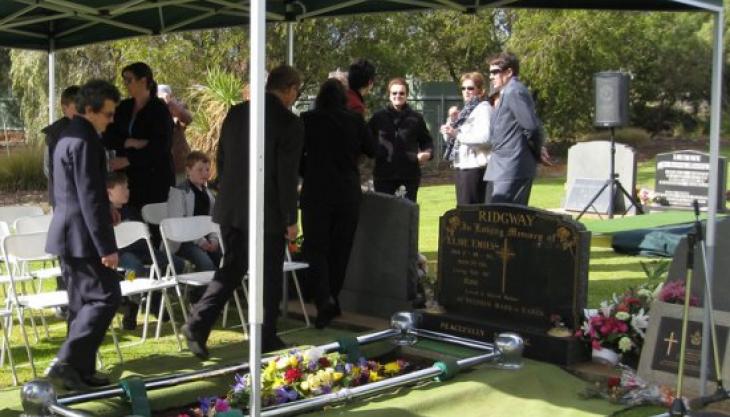What Happens If Your Spouse Dies During Your Wilmington Bankruptcy?
Submitted by Rachel R on Tue, 10/17/2017 - 10:06am

How does death affect Wilmington bankruptcy?
Image Source: Flickr User Stephan Ridgeway
You can file Wilmington bankruptcy as an individual or with your spouse as a couple. There are advantages and disadvantages to filing with or without your spouse. If your spouse dies during your bankruptcy, your case may be affected. The type of bankruptcy you filed, what assets you exempted, and which of you is liable for the debt in the bankruptcy all matter. Here is a look at what happens when your spouse passes away while you’re still in the bankruptcy process.
Debt Owed Solely by Deceased Spouse Doesn't Transfer
In Wilmington bankruptcy, there are two types of debt – sole and joint debt. For instance, if a credit card is in just your name, it’s your sole debt. But if you have a mortgage that’s in your name and your spouse’s, then it’s joint debt. When a spouse passes away, whether you’re in bankruptcy or not, death means that the other spouse isn’t responsible for unsecured debt since North Carolina isn’t a community property state. In community property states, debt and assets are considered jointly owed and owned by married people.
In North Carolina, though, we’re not a community property state. This means that if your spouse has a credit card in their name only, and then they pass away, the credit card company can try and collect from the decedent’s estate and that’s all. But they cannot demand that the surviving spouse pay the bill. The same goes for medical bills. If there is money in the estate, that’s one thing, but the surviving spouse shouldn’t be on the hook.
But secured debt is different because there’s an asset attached. For instance, if your spouse has a vehicle with a loan on it in their name only when they pass away, the surviving spouse cannot keep the car unless they pay off the loan or refinance it. The same goes with a home. If your home is in your spouse’s name and not joint, and they pass, that will be a more complex matter than if the home was jointly owned. In cases of joint ownership, the surviving spouse would be responsible for the mortgage.
What Happens with Death During Bankruptcy
With Chapter 7 bankruptcy, because the process goes by so fast, a spouse passing away likely won’t affect the case unless you find out in time to stop the case and the judge agrees to dismiss it. From start to finish, Chapter 7 Wilmington bankruptcy takes just three to four months. The process is fast-paced, and so long as you attend your 341 Meeting of Creditors and complete your bankruptcy credit counseling, there are no roadblocks to discharge.
If you filed a joint bankruptcy with your spouse, that means you had greater exemptions than if you filed individually. However, the common practice is to let the Chapter 7 bankruptcy continue because what matters is the conditions that existed at the time your bankruptcy petition was filed. As of that date, if your spouse was alive, you were entitled to joint exemptions in the shared bankruptcy. The only change would be if you requested to dismiss the case after your partner’s death and the judge and Trustee agreed with the dismissal.
With Chapter 13 bankruptcy, the process takes three to five-years, so the death of a spouse might have more effect in that type of Wilmington bankruptcy. With Chapter 13 bankruptcy, exemptions aren’t as important as in Chapter 7 liquidation bankruptcy. Death of a spouse, if they were employed, can affect your repayment plan, because you’ll have less household income and, possibly, fewer expenses. This is more complex and is a matter to bring to the attention of your bankruptcy attorney immediately.
To find out more about the benefits of bankruptcy, read reviews from our satisfied clients then contact the Law Offices of John T. Orcutt. Call +1-833-627-0115 now for a free Wilmington bankruptcy consultation at one of our convenient locations in Raleigh, Durham, Fayetteville, Wilson, Greensboro or Wilmington.
Debts Hurt! Got debt? Need help? Get started below!
Serving All of North Carolina
- Bankruptcy Attorneys Raleigh NC (North)
- Bankruptcy Attorney Fayetteville NC
- Bankruptcy Attorney Durham NC
- Bankruptcy Attorneys Wilson NC
- Bankruptcy Attorneys Greensboro NC
- Bankruptcy Attorneys Southport NC
- Bankruptcy Attorneys Wilmington NC
Bankruptcy Attorneys Raleigh NC (North)
6616 Six Forks Rd #203 Raleigh, NC 27615 North Carolina
Tel: (919) 847-9750

Bankruptcy Attorney Fayetteville NC
2711 Breezewood Ave Fayetteville, NC 28303 North Carolina
Tel: (910) 323-2972

Bankruptcy Attorney Durham NC
1738 Hillandale Rd Suite D Durham, NC 27705 North Carolina
Tel: (919) 286-1695


Bankruptcy Attorneys Greensboro NC
2100 W Cornwallis Dr. STE O Greensboro, NC 27408 North Carolina
Tel: (336) 542-5993

Bankruptcy Attorneys Southport NC
116 N Howe St. Suite A Southport, NC 28461 North Carolina
Tel: (910) 218-8682

Bankruptcy Attorneys Wilmington NC
116 N. Howe Street, Suite A Southport, NC 28461 North Carolina
Tel: (910) 447-2987
